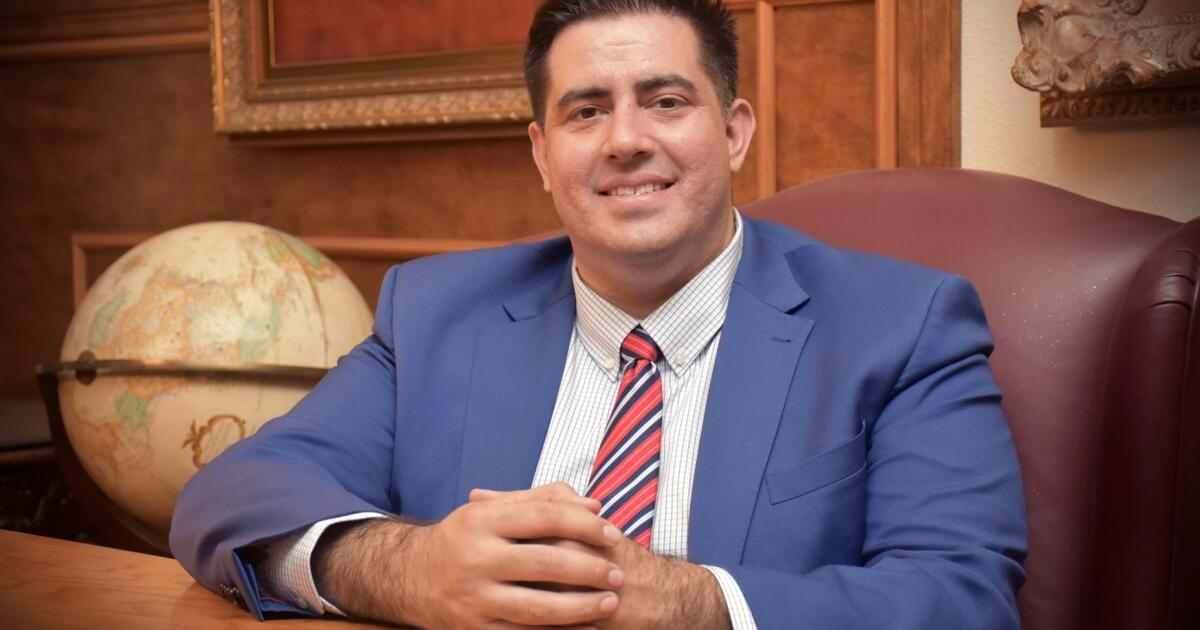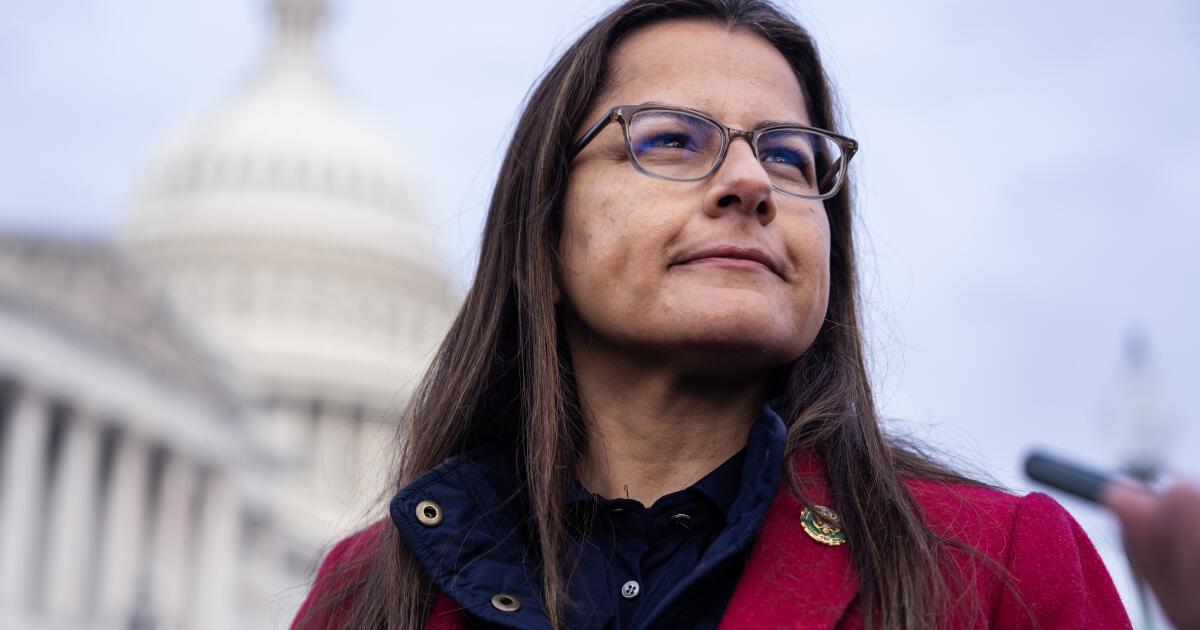California Rep. Nanette Diaz Barragán urged the Federal Communications Commission on Monday to follow through on plans to modernize the federal emergency alert system and provide multilingual alerts in natural disasters for residents who speak a language other than English at home.
The call comes nearly five months after deadly fires in Los Angeles threatened communities with a high proportion of Asian Americans and Pacific Islanders — some with limited English proficiency — highlighting the need for multilingual alerts.
In a letter sent to Brendan Carr, the Republican chair of the FCC, Barragán (D-San Pedro) expressed “deep concern” that the FCC under the Trump administration has delayed enabling multilingual Wireless Emergency Alerts for severe natural disasters such as wildfires, hurricanes, earthquakes and tsunamis.
“This is about saving lives,” Barragán said in an interview with The Times. “You’ve got about 68 million Americans that use a language other than English and everybody should have the ability to to understand these emergency alerts. We shouldn’t be looking at any politicization of alerts — certainly not because someone’s an immigrant or they don’t know English.”
Multilingual emergency alerts should be in place across the nation, Barragán said. But the January Pacific Palisades and Eaton fires served as a reminder that the need is particularly acute in Los Angeles.
Not only does L.A. have a significant risk of wildfires, flooding, mudslides, and earthquakes, but the sprawling region is home to a diverse immigrant population, some of whom have limited English proficiency.
“When you think about it, in California we have wildfires, we’re always on earthquake alert,” Barragán said. “In other parts of the country, it could be hurricanes or tornadoes — we just want people to have the information on what to do.”
Four months ago, the FCC was supposed to publish an order that would allow Americans to get multilingual alerts
In October 2023, the FCC approved rules to update the federal emergency alert system by enabling Wireless Emergency Alerts to be delivered in more than a dozen languages — not just English, Spanish and sign language — without the need of a translator.
Then, the Public Safety and Homeland Security Bureau developed templates for critical disaster alerts in the 13 most commonly spoken languages in the US. In January, the commission declared a “major step forward” in expanding alert languages when it issued a report and order that would require commercial mobile service providers to install templates on cellphones within 30 months of publication of the federal register.
“The language you speak shouldn’t keep you from receiving the information you or your family need to stay safe,” then-FCC Chairwoman Jessica Rosenworcel said in a January statement.
But shortly after, Trump took control of the White House. Under the chairmanship of Brendan Carr, the commission has yet to publish the January 8 Report and Order in the Federal Register — a critical step that triggers the 30-month compliance clock.
“This delay is not only indefensible but dangerous,” Barragán wrote in a letter to Carr that was signed by nearly two dozen members of the Congressional Hispanic Caucus, Congressional Asian Pacific American Caucus and the Congressional Black Caucus. “It directly jeopardizes the ability of our communities to receive life-saving emergency information in the language they understand best.”
Barragán noted that Carr previously supported the push for multilingual alerts when he was a member of the commission, before taking over leadership.
“Your failure to complete this ministerial step — despite having supported the rule itself — has left this life-saving policy in limbo and significantly delayed access to multilingual alerts for millions of Americans,” she wrote.
Asked by The Times what explained the delay, Barragán said her office had been told that Trump’s regulatory freeze prohibited all federal agencies, including the FCC, from publishing any rule in the Federal Register until a designated Trump official is able to review and approve it.
“It’s all politics,” she said. “We don’t know why it’s stuck there and why the administration hasn’t moved forward, but it seems, like, with everything these days, they’re waiting on the president’s green light.”
Barragán also noted that multilingual alerts helped first responders.
“If you have a community that’s supposed to be evacuated, and they’re not evacuating because they don’t know they’re supposed to evacuate, that’s only going to hurt first responders and emergency crews,” she said. “So I think this is a safety issue all around, not just for the people receiving it.”
A study published earlier this year by UCLA researchers and the Asian American and Pacific Islanders Equity Alliance found that Asian communities in harm’s way during the January L.A. fires encountered difficulties accessing information about emergency evacuations because of language barriers.
Manjusha Kulkarni, executive director of AAPI Equity Alliance, a coalition of 50 community-based groups that serves the 1.6 million Asian Americans and Pacific Islanders who live in Los Angeles, told The Times the FCC’s failure to push alerts in more languages represented a “real dereliction of duty.”
Over half a million Asian Americans across L.A. County are classified as Limited English Proficiency, with many speaking primarily in Chinese, Korean, Tagalog and Vietnamese, she noted.
“President Trump and many members of his administration have made clear they plan to go on the attack against immigrants,” Kulkarni said. “If this makes the lives of immigrants easier, then they will stand in its way.”
During the January L.A. fires, Kulkarni said, residents complained that fire alerts were sent only in English and Spanish. More than 12,000 of the 50,000 Asian immigrants and their descendants who lived within four evacuation zones — Palisades, Eaton, Hurst and Hughes — need language assistance.
“There were community members who didn’t realize until they were evacuated that the fire was so close to them, so they had little to no notice of it,” Kulkarni said. “Really, it can mean life or death in a lot of cases where you don’t get the information, where it’s not translated in a city and county like Los Angeles.”
Community members ended up suffering not just because of the fires themselves, Kulkarni said, but because of federal and local officials’ failure to provide alerts in languages every resident can understand.
“It is incumbent that the alerts be made available,” she said. “We need those at local, state and federal levels to do their part so that individuals can survive catastrophic incidents.”

